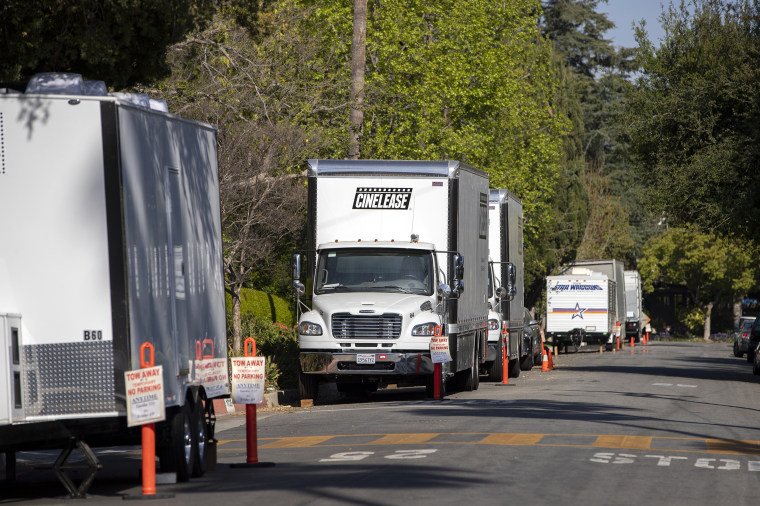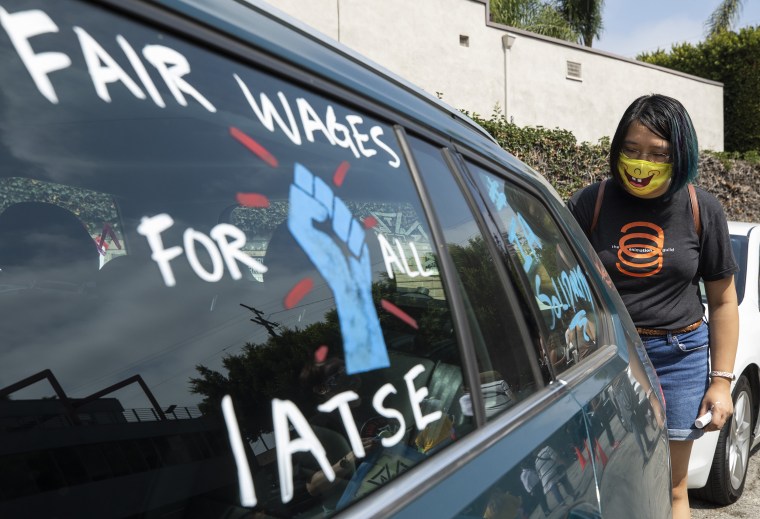
For decades critics have bemoaned the lack of Latinos in Hollywood, from talent agency mailrooms to studio titans. And for decades little has changed, even as Latinos have become the largest ethnic group in the industry's home state of California.
Yet labor leaders who are gearing up for a potential strike by an estimated 60,000 behind-the-scenes film and television workers are recruiting Latinos, the heart of the state's working class, for an endorsement.
Many Latinos are embracing the International Alliance of Theatrical Stage Employees (IATSE) in its fight for shorter hours, sustainable wages, fair pay from digital, and safer workplaces — despite the union's poor and murky record on diversity hiring.

On Friday the Washington, D.C.-based Labor Council for Latin American Advancement (LCLAA) said in a statement that it supports IATSE's bid: "We stand as one in our fight to end unsafe hours, unlivable wages and the lack of reasonable rest on set."
But its communications and policy director, Pablo Stein, said the council, which influences labor and union policy for more than two million Latinos who are part of the labor umbrella group AFL-CIO, is not letting IATSE off the hook for what Variety's sources in summer described as exclusionary hiring driven by nepotism.
"As Latino trade unionists, we believe in the power of collective action and bargaining, and we are always inclined to support our brothers and sisters who fight for dignified working conditions and against corporate greed," he emailed. "At the same time, we recognize that discriminatory practices persist in the labor movement and are partially responsible for the underrepresentation of Latinos in the media industry."
Actor Edward James Olmos is also supporting IATSE, tweeting last month, "I hope that you’ll stand with us in this fight."
Even as Latinos often compose one in four ticket buyers for blockbuster films and are "overrepresented in the population of daily viewers" of movies on digital platforms, according to the Motion Picture Association, IATSE has failed miserably to reflect them.
In July Variety published an analysis of diversity among 21 California unions, most affiliated with IATSE, and found 16.1 percent of members' surnames were Hispanic in a state that's nearly 40 percent Latino. IATSE subsequently said it would undertake an annual survey to determine the self-reported race and ethnicity of its members.
Its top leadership roles compose a virtual wall of white men, with a few exceptions.
The organization did not respond to a request for comment. Its adversary in the potential job action, the Alliance of Motion Picture and Television Producers (AMPTP), declined to comment.
Less than two weeks ago U.S. Rep. Joaquin Castro, D-Texas, unveiled a Government Accountability Office report that found that from 2014 to 2019 Latino representation in media, including news and Hollywood, has gone virtually unchanged despite its growing population.
"Latinos are mostly invisible in the image-defining and narrative-creating institutions of American society," Castro said in a statement at the time.
Ana-Christina Ramón, co-author of UCLA's annual Hollywood Diversity Report, in which Latinos have achieved no more than six percent of main cast roles in television in film since 2014, argued that Latinos can hold IATSE accountable and at the same time support it in its fight with producers.
"Latinos can demand better access and more representation while still advocating for safe working conditions and regular working hours, which seems to be at the core of what IATSE is requesting," she said by email.
This hasn't happened in Hollywood, despite a pro-diversity chorus in the last decade.
"Below-the-line" jobs, much of the work behind the scenes in Hollywood, including set builders, are believed to be relatively well-paying and more accessible to those without college degrees.
They're a rare shot at the shrinking California dream for the working class in a state where the cost of living, including astronomical rents and home prices, has contributed to homelessness and made heading into the workforce without a college degree virtually untenable.
But they're coveted and protected by blue collar unions.
Kent Wong, director of the UCLA Labor Center, said they must become accessible to Latinos if the state's shrinkinng middle class is to survive.
"These are solid middle class jobs with good benefits that can provide a step up," he said. "I think it’s in the interest of the Latino community to support the expansion of unionization."
Christian Castro, spokesman for the Los Angeles Federation of Labor, an AFL-CIO organization that's heavily Latino, said by email that an agreement between IATSE and producers "will benefit both the current workers and any future workers."
"A collective bargaining agreement is historically one of the greatest tools for creating pathways out of poverty for historically marginalized populations like our Black, Latino, and LGBTQ populations," he said.
Wong urged Latinos in the labor movement to pressure IATSE at this vulnerable moment, when members' authorization for what could be the largest strike by Hollywood production workers since World War II, could take place by Monday.
"We have seen the very public outcry against the lack of actors of color," Wong said. "This is exactly the time to ensure diversity is not just in front of the camera but also behind the camera."
Written by Dennis Romero for NBC
Comments